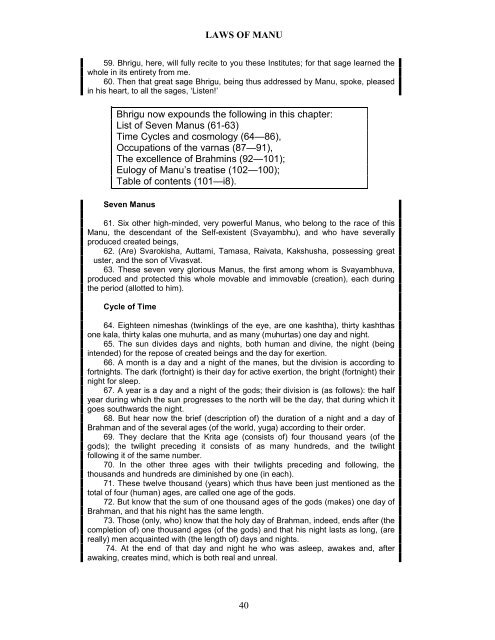Create successful ePaper yourself
Turn your PDF publications into a flip-book with our unique Google optimized e-Paper software.
LAWS OF MANU<br />
59. Bhrigu, here, will fully recite to you these Institutes; for that sage learned the<br />
whole in its entirety from me.<br />
60. Then that great sage Bhrigu, being thus addressed by Manu, spoke, pleased<br />
in his heart, to all the sages, ‘Listen!’<br />
Bhrigu now expounds the following in this chapter:<br />
List of Seven Manus (61-63)<br />
Time Cycles and cosmology (64—86),<br />
Occupations of the varnas (87—91),<br />
The excellence of Brahmins (92—101);<br />
Eulogy of Manu’s treatise (102—100);<br />
Table of contents (101—i8).<br />
Seven Manus<br />
61. Six other high-minded, very powerful Manus, who belong to the race of this<br />
Manu, the descendant of the Self-existent (Svayambhu), and who have severally<br />
produced created beings,<br />
62. (Are) Svarokisha, Auttami, Tamasa, Raivata, Kakshusha, possessing great<br />
uster, and the son of Vivasvat.<br />
63. These seven very glorious Manus, the first among whom is Svayambhuva,<br />
produced and protected this whole movable and immovable (creation), each during<br />
the period (allotted to him).<br />
Cycle of Time<br />
64. Eighteen nimeshas (twinklings of the eye, are one kashtha), thirty kashthas<br />
one kala, thirty kalas one muhurta, and as many (muhurtas) one day and night.<br />
65. The sun divides days and nights, both human and divine, the night (being<br />
intended) for the repose of created beings and the day for exertion.<br />
66. A month is a day and a night of the manes, but the division is according to<br />
fortnights. The dark (fortnight) is their day for active exertion, the bright (fortnight) their<br />
night for sleep.<br />
67. A year is a day and a night of the gods; their division is (as follows): the half<br />
year during which the sun progresses to the north will be the day, that during which it<br />
goes southwards the night.<br />
68. But hear now the brief (description of) the duration of a night and a day of<br />
Brahman and of the several ages (of the world, yuga) according to their order.<br />
69. They declare that the Krita age (consists of) four thousand years (of the<br />
gods); the twilight preceding it consists of as many hundreds, and the twilight<br />
following it of the same number.<br />
70. In the other three ages with their twilights preceding and following, the<br />
thousands and hundreds are diminished by one (in each).<br />
71. These twelve thousand (years) which thus have been just mentioned as the<br />
total of four (human) ages, are called one age of the gods.<br />
72. But know that the sum of one thousand ages of the gods (makes) one day of<br />
Brahman, and that his night has the same length.<br />
73. Those (only, who) know that the holy day of Brahman, indeed, ends after (the<br />
completion of) one thousand ages (of the gods) and that his night lasts as long, (are<br />
really) men acquainted with (the length of) days and nights.<br />
74. At the end of that day and night he who was asleep, awakes and, after<br />
awaking, creates mind, which is both real and unreal.<br />
40


















